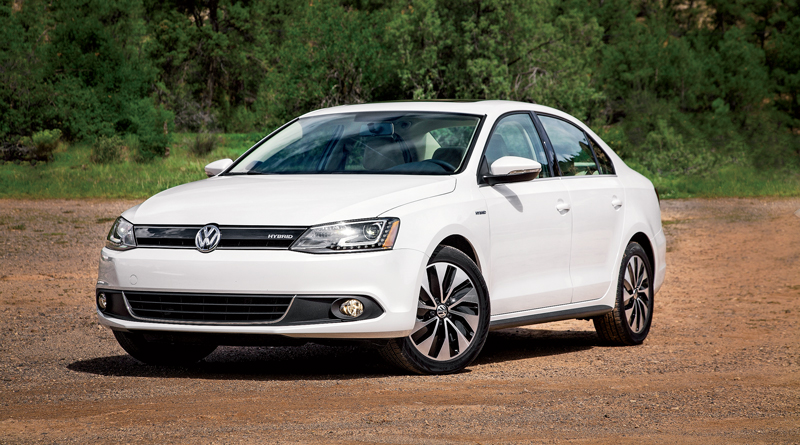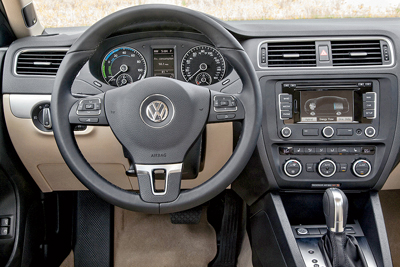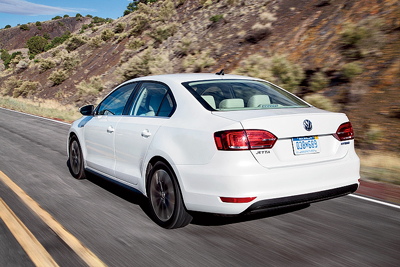A New Approach to Fuel Economy | 2013 Volkswagen Jetta Hybrid
By Marc Schulhof
July 2013 View more For The Road
 Arriving on the market long after Prius became virtually synonymous with fuel-efficient compact sedans, the Volkswagen Jetta Hybrid might seem late to the party. But in the quest for a piece of the high-miles-per-gallon market, it has an ace up its sleeve.
Arriving on the market long after Prius became virtually synonymous with fuel-efficient compact sedans, the Volkswagen Jetta Hybrid might seem late to the party. But in the quest for a piece of the high-miles-per-gallon market, it has an ace up its sleeve.
The Jetta Hybrid is a Jetta, the newest member of a family that traces its lineage back six generations, and that represents VW’s best-selling model. It drives like a Jetta, too. So it’s a given that this compact sedan will delight shoppers who yearn for both a hybrid’s fuel economy and a Volkswagen’s typical driving performance.
In fact, the Jetta Hybrid might face its greatest competition from within the Volkswagen fold. That’s because the turbo-diesel Jetta TDI model, or the Passat TDI, or Golf TDI, or Beetle TDI, represents another well-tested option for aspiring VW owners who also aspire to fantastic fuel efficiency.
The gas-electric Jetta Hybrid is EPA rated at a combined city-highway 45 miles per gallon. The TDI puts up impressive numbers of its own—as much as 30 city/42 highway. By comparison, the most efficient gas-only Jetta is rated at 24 city/34 highway.
 For engine-agnostic buyers who are focused solely on the best overall value, the Hybrid versus TDI decision might require a spreadsheet and a set of complex financial projections. Among the considerations are the cost of gas versus the cost of diesel and the higher prices charged for the Hybrid and TDI models versus the gas Jettas. To make things even more interesting, the Hybrid requires premium gas, while the gas-only Jettas make do with regular unleaded.
For engine-agnostic buyers who are focused solely on the best overall value, the Hybrid versus TDI decision might require a spreadsheet and a set of complex financial projections. Among the considerations are the cost of gas versus the cost of diesel and the higher prices charged for the Hybrid and TDI models versus the gas Jettas. To make things even more interesting, the Hybrid requires premium gas, while the gas-only Jettas make do with regular unleaded.
The one sure thing is that buyers of the new Hybrid will not miss out on the full Volkswagen experience. This is a quick and sure-footed car, with plenty of acceleration and a pleasant ride. Its dual-clutch automatic transmission is a first in a hybrid, according to VW, and gets the most out of the turbocharged engine and electric motor.
The Jetta Hybrid’s interior is also classic VW—meaning crisp design, comfortable seats, good visibility, and easy-to-understand switches and controls. Various gauges and displays offer information about the car’s energy usage. And, thankfully for those of us who appreciate the direct approach, the Jetta’s stereo and climate control system are still accessed by a twist of ye olde knob.
However, the Jetta Hybrid is not a compromise-free decision. As with hybrid models from many other manufacturers, the Jetta Hybrid’s brakes are quite grabby. That may just be the price you have to pay for better fuel economy. The system returns some of the braking energy back into the car’s battery—ask a middle school science teacher to explain. But those jerky stops can get tiresome. The Hybrid also has a tendency to wander forward at idle, so once stopped, you’ll need a firmly planted right foot.
 The 2013 VW Jetta Hybrid starts at $24,995. If you choose the highest Hybrid trim instead, you’ll pay $31,180 plus options. Unlike the other Jettas, the Hybrid models come standard with an automatic transmission.
The 2013 VW Jetta Hybrid starts at $24,995. If you choose the highest Hybrid trim instead, you’ll pay $31,180 plus options. Unlike the other Jettas, the Hybrid models come standard with an automatic transmission.
The new Hybrid model joins a Jetta lineup that virtually shouts “something for everyone.” A base model starts at just under $17,000, while the performance-minded GLI edition stickers up to $29,000. In between are a bunch of gasoline-powered models, all of which offer automatic or manual transmissions. The Hybrid’s closest Jetta competitors are the TDI models, which also command a premium over comparable gas-powered Jetta models. They are priced at $23,000 to $27,000.


